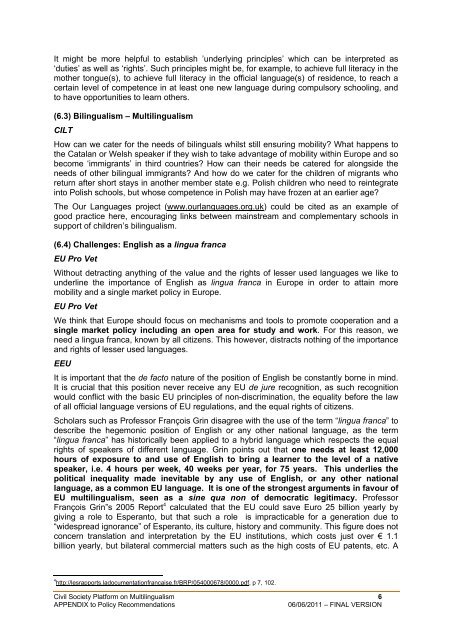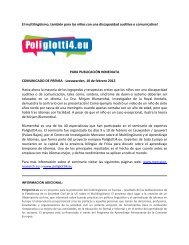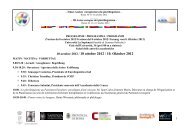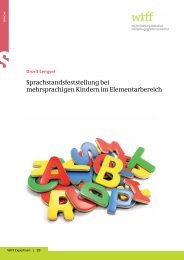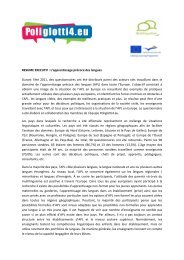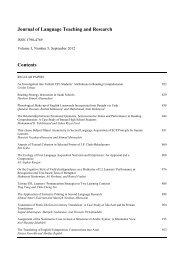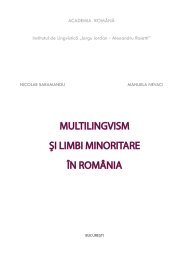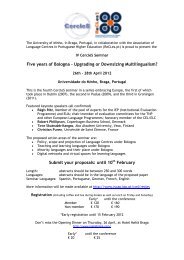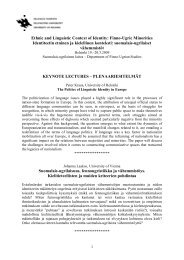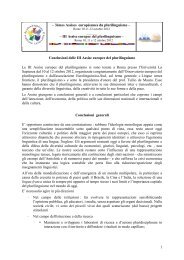FULL VERSION - European Commission - Europa
FULL VERSION - European Commission - Europa
FULL VERSION - European Commission - Europa
You also want an ePaper? Increase the reach of your titles
YUMPU automatically turns print PDFs into web optimized ePapers that Google loves.
It might be more helpful to establish ’underlying principles’ which can be interpreted as‘duties’ as well as ‘rights’. Such principles might be, for example, to achieve full literacy in themother tongue(s), to achieve full literacy in the official language(s) of residence, to reach acertain level of competence in at least one new language during compulsory schooling, andto have opportunities to learn others.(6.3) Bilingualism – MultilingualismCILTHow can we cater for the needs of bilinguals whilst still ensuring mobility? What happens tothe Catalan or Welsh speaker if they wish to take advantage of mobility within Europe and sobecome ‘immigrants’ in third countries? How can their needs be catered for alongside theneeds of other bilingual immigrants? And how do we cater for the children of migrants whoreturn after short stays in another member state e.g. Polish children who need to reintegrateinto Polish schools, but whose competence in Polish may have frozen at an earlier age?The Our Languages project (www.ourlanguages.org.uk) could be cited as an example ofgood practice here, encouraging links between mainstream and complementary schools insupport of children’s bilingualism.(6.4) Challenges: English as a lingua francaEU Pro VetWithout detracting anything of the value and the rights of lesser used languages we like tounderline the importance of English as lingua franca in Europe in order to attain moremobility and a single market policy in Europe.EU Pro VetWe think that Europe should focus on mechanisms and tools to promote cooperation and asingle market policy including an open area for study and work. For this reason, weneed a lingua franca, known by all citizens. This however, distracts nothing of the importanceand rights of lesser used languages.EEUIt is important that the de facto nature of the position of English be constantly borne in mind.It is crucial that this position never receive any EU de jure recognition, as such recognitionwould conflict with the basic EU principles of non-discrimination, the equality before the lawof all official language versions of EU regulations, and the equal rights of citizens.Scholars such as Professor François Grin disagree with the use of the term “lingua franca” todescribe the hegemonic position of English or any other national language, as the term“lingua franca” has historically been applied to a hybrid language which respects the equalrights of speakers of different language. Grin points out that one needs at least 12,000hours of exposure to and use of English to bring a learner to the level of a nativespeaker, i.e. 4 hours per week, 40 weeks per year, for 75 years. This underlies thepolitical inequality made inevitable by any use of English, or any other nationallanguage, as a common EU language. It is one of the strongest arguments in favour ofEU multilingualism, seen as a sine qua non of democratic legitimacy. ProfessorFrançois Grin”s 2005 Report 4 calculated that the EU could save Euro 25 billion yearly bygiving a role to Esperanto, but that such a role is impracticable for a generation due to“widespread ignorance” of Esperanto, its culture, history and community. This figure does notconcern translation and interpretation by the EU institutions, which costs just over € 1.1billion yearly, but bilateral commercial matters such as the high costs of EU patents, etc. A4http://lesrapports.ladocumentationfrancaise.fr/BRP/054000678/0000.pdf, p 7, 102.Civil Society Platform on Multilingualism 6APPENDIX to Policy Recommendations06/06/2011 – FINAL <strong>VERSION</strong>


